The Kaiser Family Foundation has continued their work to track and interpret American’s evolving views and opinions of development assistance for global health and recently released a report summarizing their findings. They have some of the best and clearest analysis of U.S. appropriations for global health. 1 2
Some key points that seem particularly relevant to the global health political field:
- Americans really don’t know much about development assistance and foreign aid as it relates to global health. Americans believe that we should be the world leader in global affairs, but also that we are doing more than our fair share already.
- Foreign aid is initially viewed with skepticism, but with a little more information and context, people’s views change favorably.
- Americans systematically overestimate of the amount spent by the U.S. on foreign aid for global health purposes.
- There is a growing political rift between Democrats and Republicans about the value of U.S. investments in global health.
Skepticism:
There seems to be misunderstanding of what USG investments are being made for global health purposes and a general skepticism about their effects. People think that we should be serving as a (or the) world leader on global affairs, but then at the same time think that we are already doing our “fair share”.
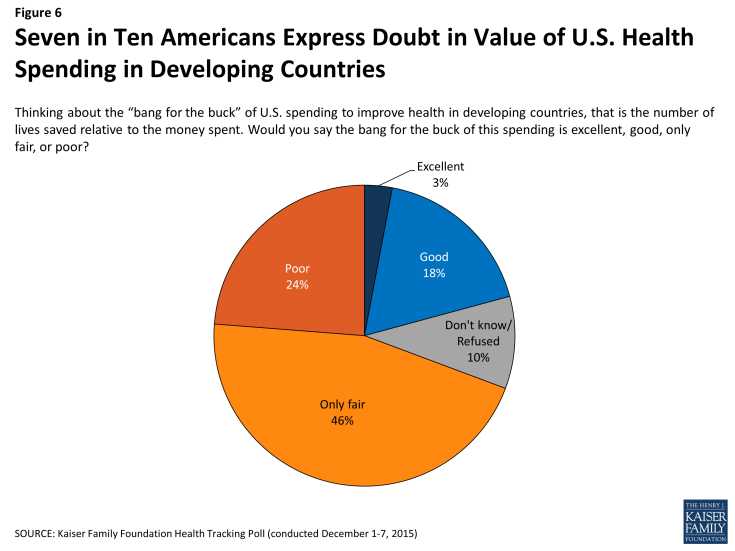
Additionally, people feel like corruption is one of the most important problems with development assistance for health.
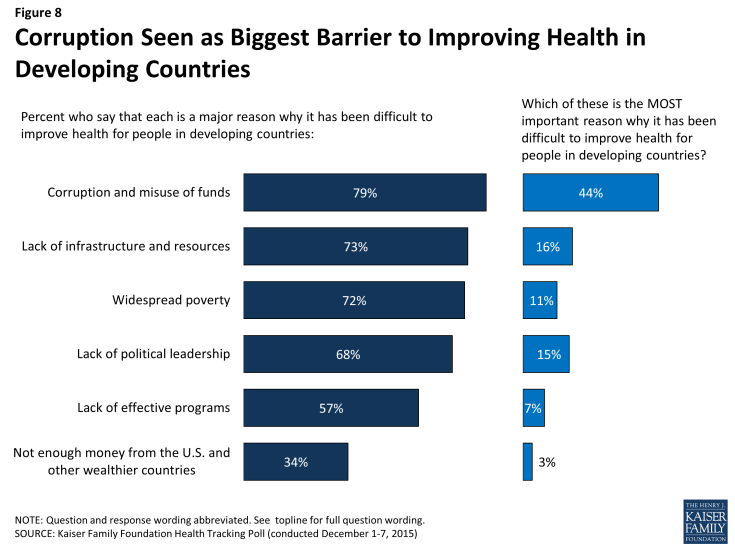
Overestimation:
Americans also consistently and wildly overestimate the amount of money committed to global health programs, answering on average that they think at least 31% of the federal budget is spent on foreign aid.
It would be interesting to dig more into why this is the case. Do people have no idea what the federal budget really is? Do they have any sense what constitutes U.S. global health funding? Do people similarly overestimate the amount of funding for other types of programs / elements of the federal budget?
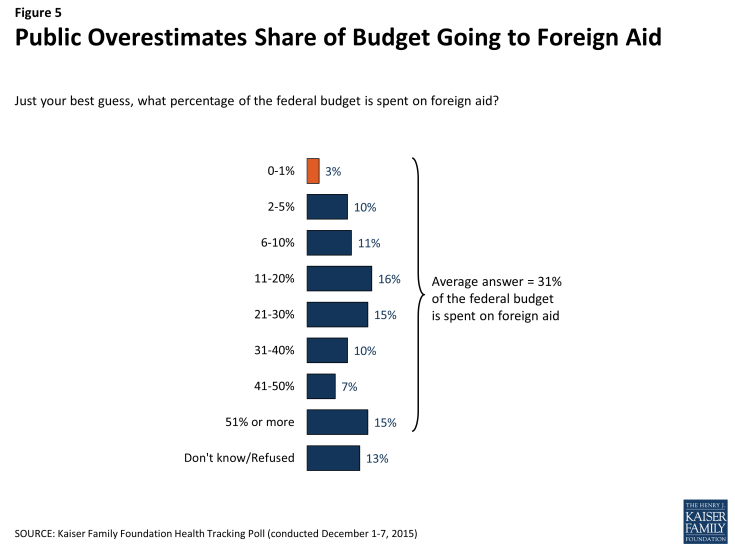
Political Divide:
Finally, there is a growing partisan divide in the level of importance that democrats and republicans place on USG global health investments. This partisan divide on global health, though while not enormous, has grown by 11 percentage points since 2012.
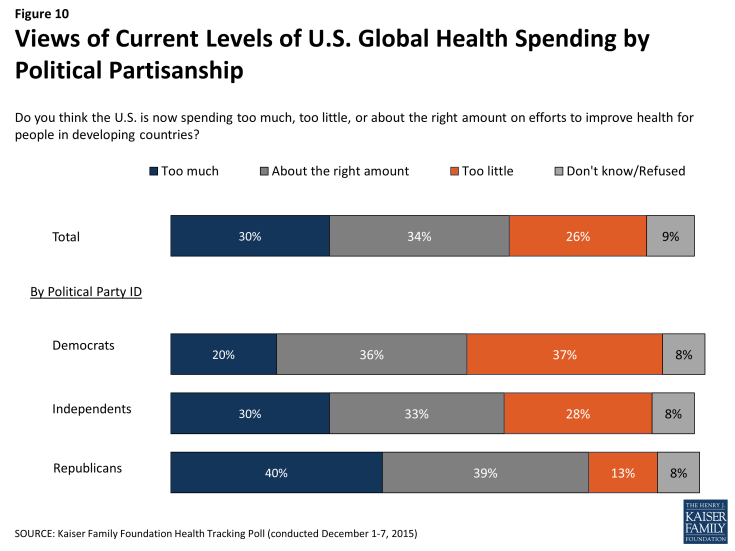
To me, everything about this research points to why a community organizing model of movement building for the global right to health is so important. People generally have very little clue what we mean when we talk about U.S. investments in global health and they assume that we spend far more money than we actually do on programs that they assume don’t work very well. This absence of data / narrative / perspective fuels a partisan divide that stems from a fundamental difference of opinion of the role of government.
As I discussed in my recent previous post about opportunities for research in the social movement for the right to health, McAdam’s political process model 3 describes the emergence of social movements through the mobilization of organized grassroots groups, generation of new stories / narratives / evidence / data of possibilities to enable new frames of ‘cognitive liberation’ that can be disseminated by organized groups, and the harnessing of newly emergent political opportunities.
Luckily this report does point to one important political opportunity: Americans believe that investing in programs that advance global health is the right thing to do.
“Although many acknowledge there are domestic interests that could benefit from global health aid, nearly half of Americans (46 percent) say that the most important reason that the U.S. spends money on improving health for people in developing countries is because it’s the right thing to do.”
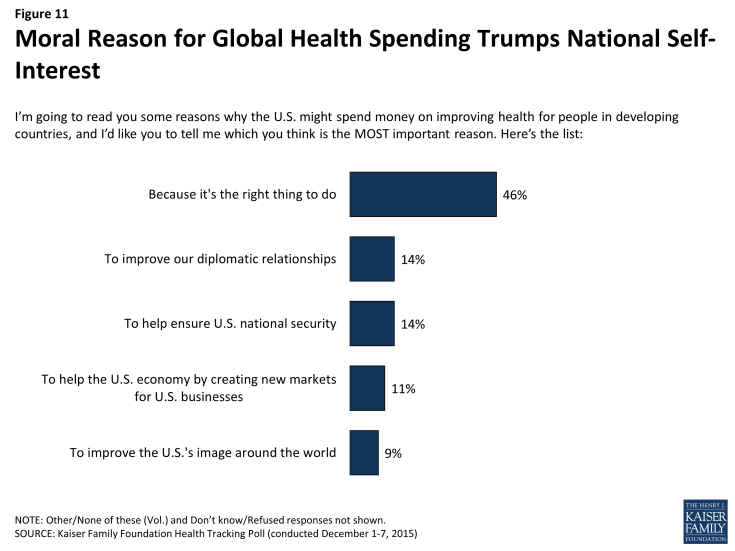
This is a significant political opportunity. In the wake of the Ebola epidemic, the emergence of the Sustainable Development Goals (though they note that very few Americans know what the SDGs are) and despite the skepticism and growing partisan gaps, Americans still think that we should invest in global health because it’s the right things to do. This moral imagination is something that must be harnessed.
We need to continue to share the stories of patients, of systems, of transformation, and demonstrate what is truly possible with a commitment to building systems oriented to the most poor and marginalized.
- http://kff.org/global-health-policy/issue-brief/the-u-s-global-health-budget-analysis-of-appropriations-for-fiscal-year-2015/ ↩
- http://kff.org/global-health-policy/issue-brief/the-u-s-global-health-budget-analysis-of-the-fiscal-year-2015-budget-request/ ↩
- McAdam, Doug. Political Process and the Development of Black Insurgency, 1930-1970. Chicago: University of Chicago Press, 1982. 40-51. ↩